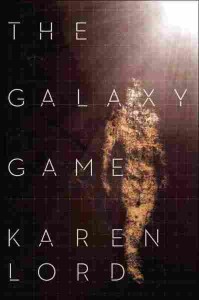“The Galaxy Game” by Karen Lord
 I was really excited to get a review copy of The Galaxy Game by Karen Lord; I absolutely loved both of Lord’s prior novels – I reviewed Redemption in Indigo pretty recently, and The Best of All Possible Worlds is one of my favourite books of the last few years (and shares a world and some characters with The Galaxy Game). Unfortunately, I ended up being pretty disappointed with the book.
I was really excited to get a review copy of The Galaxy Game by Karen Lord; I absolutely loved both of Lord’s prior novels – I reviewed Redemption in Indigo pretty recently, and The Best of All Possible Worlds is one of my favourite books of the last few years (and shares a world and some characters with The Galaxy Game). Unfortunately, I ended up being pretty disappointed with the book.
The main protagonist is Rafi, the nephew of The Best of All Possible Worlds, Grace Delarua, who has been forced to attend an oppressive school for the psionically gifted. He escapes with the help of one of his friends, and is thrown unprepared into a galaxy that is undergoing considerable turmoil. We also follow his two friends, Ntenman and Serendipity as they find their own way.
So, there were a bunch of problems with this book:
- Rafi: Rafi should have been interesting – he’s scared of his psionic abilities because of the way his father abused his own, and he has a difficult relationship with his mother who’s scared of being manipulated by him. He’s doing exciting things – he’s exploring a new planet, and training for a galaxy-famous sport. Unfortunately, he just comes off as a child who’s mostly passive but occasionally reactionary (he even admits as much in the book) – the only thing he does actively is run away from his school. In the end, when he finds a place in society, it seems to be mainly because everyone else told him what to do.
- The other viewpoint characters: I’m not really sure why Ntenman and Serendipity were protagonists – sure, we did watch them “grow up” a bit too, but their arcs were as dissatisfying as Rafi’s. This book was only 320 pages, and it didn’t have enough room for us to get to know these characters and invest in them. Ntenman’s voice was pretty charming, and I at least looked forward to his dry humour, but Serendipity seemed completely flat. Also, we get viewpoints from Delarua, Dllenahkh and the headmaster of the Lyceum (there might be more that I’m forgetting), and there’s even a framing story that takes place fifteen or so years later. This makes the book seem pretty fragmented, especially given…
- The plot, or lack thereof: Okay, there is nominally a plot – the protagonists come of age in a time of great galactic turmoil, which they are marginally involved in. Emphasis on the “marginally”. As I said earlier, a lot of the stuff that happens is just Rafi reacting to what other people tell him to do, and most of the time, he just does it. So yes, a lot of stuff happens, but we’re just left with burning curiosity about what’s actually going on. For example, a planet gets attacked by a rival faction, but we have very little context for it, so it’s not very impactful, except for a generic “war is bad” way. And there are many factions, each with their own agenda, but we know very little. But the plot isn’t even about the galactic conflict, per se, but about developing a new transportation technique… that somehow involves a sport that Rafi is uniquely qualified to play, but it’s actually about Rafi and his friends growing up, but there’s also the plot of the framing story…
- Characters from the previous books: Okay, I loved Delarua and Dllenahkh and the assorted supporting characters in The Best of All Possible Worlds, but they should not have been in this book this much unless it was at least twice the size. Pretty much everyone shows up, and we learn all about their problems, and how they’re resolved (Freyda and Lanuri’s marriage, Lian’s worry over the missing Queturah), and they add to the mess of plots already in the book.
If I were to describe the flaws of The Galaxy Game in one word, it would be “unfocused”. Both of Lord’s previous books were pretty intimate – they were mostly focused on one or two people and the consequences to their own life, and she’s very good at that type of narrative. She seems to be trying to do that in this book, focusing somewhat on Rafi and his friends’ coming of age, but it doesn’t really work that well because there’s so much going on in the grander scale. There was a lot going on in the grander scale in The Best of All Possible Worlds too, with the destruction of Sadira, but that was much more personal because of Dllenahkh.
I know that it seems like I hated this book, but I didn’t; I just had really high expectations from Lord’s previous work. The Galaxy Game has beautiful prose and fascinating ideas. It would have been great as either a 600 page book or a novella with a lot of the subplots cut out. I’m still anticipating Lord’s next book eagerly, though – I hope it is a return to her previous form.
